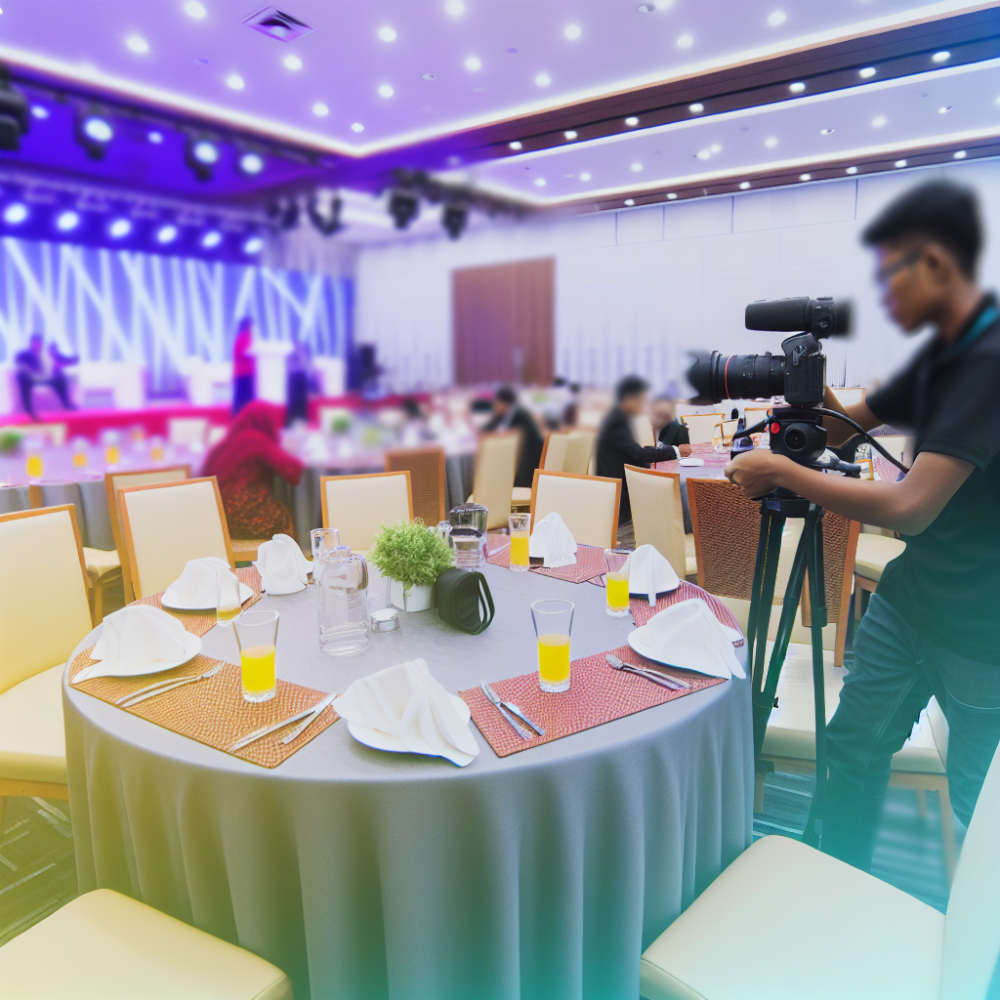Key Responsibilities of an Event Consultant
Event Consultant Job Description
Key Responsibilities of an Event Consultant
Event consultants play a crucial role in the planning and execution of successful events. They are responsible for overseeing all aspects of an event, from the initial concept to the final implementation. In this article, we will explore the key responsibilities of an event consultant and the skills required to excel in this role.
One of the primary responsibilities of an event consultant is to understand the client’s objectives and vision for the event. This involves conducting thorough research and gathering information about the client’s goals, target audience, and budget. By understanding the client’s needs, an event consultant can develop a comprehensive event plan that aligns with the client’s vision.
Once the event plan is in place, an event consultant is responsible for coordinating all the necessary logistics. This includes securing a suitable venue, arranging for catering services, and coordinating with vendors for equipment rentals. Attention to detail is crucial in this role, as even the smallest oversight can have a significant impact on the success of an event.
In addition to logistics, an event consultant is also responsible for managing the event budget. This involves creating a detailed budget plan, tracking expenses, and ensuring that the event stays within the allocated budget. Effective budget management requires strong financial acumen and the ability to negotiate with vendors to secure the best possible prices.
Another key responsibility of an event consultant is to oversee the event marketing and promotion. This includes developing a marketing strategy, creating promotional materials, and utilizing various marketing channels to reach the target audience. Effective communication skills are essential in this role, as an event consultant must be able to convey the event’s value proposition to potential attendees.
On the day of the event, an event consultant is responsible for ensuring that everything runs smoothly. This involves coordinating with the event staff, managing any last-minute changes or issues, and troubleshooting any problems that may arise. The ability to remain calm under pressure and think on their feet is crucial for an event consultant to handle unexpected situations effectively.
Post-event, an event consultant is responsible for evaluating the success of the event and gathering feedback from attendees and stakeholders. This feedback is valuable in identifying areas for improvement and making recommendations for future events. Analytical skills are essential in this role, as an event consultant must be able to analyze data and draw meaningful insights from it.
To excel in this role, an event consultant must possess a combination of skills and qualities. Strong organizational and time management skills are essential, as an event consultant must juggle multiple tasks and deadlines simultaneously. Excellent interpersonal and communication skills are also crucial, as an event consultant must work closely with clients, vendors, and event staff.
In conclusion, the key responsibilities of an event consultant encompass all aspects of event planning and execution. From understanding the client’s objectives to managing logistics, marketing, and budget, an event consultant plays a vital role in ensuring the success of an event. With the right skills and qualities, an event consultant can create memorable experiences that leave a lasting impression on attendees.
Skills and Qualifications Required for Event Consulting

Event Consultant Job Description
Skills and Qualifications Required for Event Consulting
Event consulting is a highly specialized field that requires a unique set of skills and qualifications. As an event consultant, you will be responsible for planning, organizing, and executing various types of events, ranging from corporate conferences to weddings and social gatherings. To excel in this role, you must possess a combination of technical expertise, creativity, and strong interpersonal skills.
First and foremost, a successful event consultant must have excellent organizational skills. You will be juggling multiple tasks and deadlines, so the ability to prioritize and manage your time effectively is crucial. From creating detailed event timelines to coordinating with vendors and managing budgets, you must be able to stay organized and keep all aspects of the event on track.
In addition to organizational skills, event consultants must also have strong communication skills. You will be working closely with clients, vendors, and other stakeholders, so the ability to effectively communicate your ideas and expectations is essential. Whether it’s negotiating contracts with suppliers or presenting event proposals to clients, clear and concise communication is key to ensuring everyone is on the same page.
Creativity is another important skill for event consultants. You will be responsible for designing and creating unique and memorable experiences for your clients and their guests. From selecting the perfect venue to designing the event layout and decor, your creative vision will play a significant role in the success of the event. Thinking outside the box and coming up with innovative ideas will set you apart from the competition and leave a lasting impression on your clients.
Attention to detail is also critical in event consulting. From the smallest details like table settings and floral arrangements to larger logistical considerations like transportation and guest accommodations, every aspect of the event must be carefully planned and executed. A keen eye for detail will ensure that nothing is overlooked and that the event runs smoothly from start to finish.
Flexibility and adaptability are also important qualities for event consultants. No two events are the same, and you must be able to adapt to different client preferences and changing circumstances. Whether it’s adjusting the event timeline on the fly or finding creative solutions to unexpected challenges, being able to think on your feet and adapt quickly is essential in this fast-paced industry.
Lastly, a successful event consultant must have a passion for customer service. Your clients will rely on you to bring their vision to life and create an unforgettable experience for their guests. Going above and beyond to exceed their expectations and provide exceptional service is what will set you apart and ensure repeat business and referrals.
In conclusion, event consulting requires a unique combination of skills and qualifications. From organizational and communication skills to creativity and attention to detail, event consultants must possess a diverse range of abilities. Flexibility, adaptability, and a passion for customer service are also crucial in this fast-paced industry. If you have a love for event planning and possess these skills, a career as an event consultant may be the perfect fit for you.
Importance of Event Consultants in Successful Event Planning
Event planning is a complex and multifaceted process that requires careful attention to detail and a keen understanding of the event’s objectives. One crucial element in ensuring the success of any event is the involvement of an event consultant. Event consultants play a vital role in the planning and execution of events, bringing their expertise and experience to the table to ensure that everything runs smoothly.
One of the primary reasons why event consultants are essential in successful event planning is their ability to provide expert guidance and advice. These professionals have a deep understanding of the industry and are well-versed in the latest trends and best practices. They can offer valuable insights into various aspects of event planning, such as venue selection, budgeting, and marketing strategies. By leveraging their knowledge and expertise, event consultants can help event organizers make informed decisions that align with their goals and objectives.
Another key role that event consultants play is that of a problem solver. No matter how well-planned an event may be, unexpected challenges and issues can arise at any moment. It is during these times that event consultants truly shine. With their quick thinking and problem-solving skills, they can effectively address any issues that may arise, ensuring that the event stays on track and meets its objectives. Whether it’s a last-minute change in the schedule or a technical glitch, event consultants are adept at finding solutions that keep the event running smoothly.
Furthermore, event consultants are instrumental in coordinating and managing various vendors and suppliers involved in the event. From caterers to decorators to audiovisual technicians, there are numerous parties involved in making an event a success. Coordinating these different entities can be a daunting task, but event consultants excel in this area. They have established relationships with a wide network of vendors and suppliers, allowing them to negotiate contracts, manage logistics, and ensure that everyone is working together seamlessly.
In addition to their practical skills, event consultants also bring a fresh perspective to the table. They have a keen eye for detail and can offer creative ideas and suggestions that can elevate the overall experience of the event. Whether it’s incorporating unique themes or implementing innovative technologies, event consultants can help make an event memorable and impactful.
Lastly, event consultants play a crucial role in ensuring that events are executed within budget. They are skilled at creating and managing budgets, ensuring that resources are allocated efficiently and effectively. By closely monitoring expenses and identifying cost-saving opportunities, event consultants can help event organizers stay within their financial constraints without compromising on the quality of the event.
In conclusion, event consultants are an integral part of successful event planning. Their expertise, problem-solving skills, vendor management abilities, creative ideas, and budgeting prowess all contribute to the seamless execution of events. By enlisting the help of an event consultant, event organizers can ensure that their events are not only well-planned but also memorable and impactful. So, the next time you’re planning an event, consider the invaluable role that an event consultant can play in making it a resounding success.
Challenges Faced by Event Consultants and How to Overcome Them
Event consultants play a crucial role in the planning and execution of successful events. From corporate conferences to weddings, these professionals are responsible for ensuring that every detail is meticulously planned and flawlessly executed. However, like any job, event consulting comes with its fair share of challenges. In this section, we will explore some of the common challenges faced by event consultants and discuss strategies to overcome them.
One of the biggest challenges faced by event consultants is managing client expectations. Clients often come to consultants with grand visions and high expectations for their events. It is the consultant’s job to understand these expectations and find ways to deliver on them within the constraints of time, budget, and resources. This requires effective communication and a deep understanding of the client’s needs and desires. By actively listening to clients and asking the right questions, consultants can ensure that they have a clear understanding of what the client wants and can manage their expectations accordingly.
Another challenge faced by event consultants is dealing with unforeseen circumstances and last-minute changes. Events are dynamic by nature, and it is not uncommon for things to go wrong or for clients to request changes at the eleventh hour. To overcome this challenge, event consultants must be adaptable and resourceful. They need to have contingency plans in place and be able to think on their feet to find creative solutions to unexpected problems. Building a strong network of reliable vendors and suppliers can also help consultants navigate these challenges more effectively.
Time management is yet another challenge faced by event consultants. Planning and executing an event involves juggling multiple tasks and deadlines. Consultants need to be highly organized and skilled at prioritizing their work to ensure that everything gets done on time. Utilizing project management tools and techniques can help consultants stay on top of their tasks and ensure that nothing falls through the cracks. It is also important for consultants to delegate tasks when necessary and to surround themselves with a competent team that can support them in their work.
Budget management is a challenge that event consultants must also contend with. Clients often have specific budget constraints, and it is the consultant’s responsibility to plan and execute the event within these limitations. This requires careful budgeting and cost control. Consultants need to be skilled at negotiating with vendors and finding creative ways to stretch the budget without compromising on quality. By being transparent with clients about the costs involved and offering alternative options, consultants can help clients make informed decisions and stay within their budget.
Lastly, event consultants often face the challenge of managing stress and maintaining work-life balance. The nature of the job can be demanding, with long hours and tight deadlines. To overcome this challenge, consultants need to prioritize self-care and set boundaries. Taking breaks, practicing stress management techniques, and seeking support from colleagues and loved ones can help consultants maintain their well-being and prevent burnout.
In conclusion, event consulting is a rewarding but challenging profession. From managing client expectations to dealing with unforeseen circumstances, event consultants face a variety of challenges in their work. However, by effectively communicating with clients, being adaptable and resourceful, managing time and budget effectively, and prioritizing self-care, consultants can overcome these challenges and deliver exceptional events.





